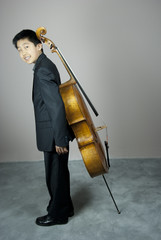|
Back
An evening of strange matters Toronto
Koerner Hall
01/26/2014 -
Peter Ruzicka: Satyagraha
Unsuk Chin: Graffiti
Zosha Di Castri: Strange Matter
Samy Moussa: Intermezzo for Orchestra
Gabriel Prokofiev: Concerto for Cello and Orchestra (3rd movement)
Bryan Cheng (cello)
Esprit Orchestra, Alex Pauk (conductor), Samy Moussa (guest conductor) 
B. Cheng (Courtesy of Esprit Orchestra)
Once again Toronto’s unique Esprit Orchestra treated its followers to yet another intriguing assortment of contemporary works, including a new work commissioned by the orchestra.
Guest conductor Samy Moussa opened the program with Peter Ruzicka’s Satyagraha, composed in 1984 (four years after the Philip Glass opera of the same title). It’s quite an involving piece, starting out with long lines carried by strings with oriental-flavoured percussion; after five minutes or so there are brass eruptions. It has a lingering finish and the conductor managed a nicely-held silence.
Alex Pauk then conducted Unsuk Chin’s Graffiti, a work premiered in 2013 by the Los Angeles Philharmonic under the dynamic Gustavo Dudamel. Orchestras in Japan and Germany were also co-commissioners. It has three sections: “Palimpsest”, “Notturno urbano”, and “Passacaglia”. The composer’s notes state that the piece is neither illustrative nor programmatic, and refers to “micropolyphony”. The opening movement percolates along in an engaging way; the contrasting second movement conjures up distant bells. Later on we get spasmodic outbursts over a string drone. There are a lot of pieces like this - sonic counterparts to abstract expressionist paintings. Graffiti is an engaging example of the type.
Canadian composer’s Zosha Di Castri’s Strange Matter is scored for an ensemble of eight players: three strings, three winds (on various instruments), percussion and piano. The title’s reference is to cutting-edge physics and her own notes contain the description “mysterious”. The work comes across as rather ambiguous, much like the subject matter. The Alberta-born, New York-based composer (born 1985) composed the work in 2011; she was at this performance.
We next heard the world premiere of Samy Moussa’s Intermezzo for Orchestra, conducted by the composer. About 13 minutes long, it is quite the ambitious piece - in fact its extreme sonics taxed the limits of Koerner Hall in places. My description for its ending is “neo-Holstian”. I hope other orchestras take note of it - it deserves to be heard.
I notice that the Toronto Symphony Orchestra has commissioned a work from Samy Moussa to be performed in their 2014-15 season. In both works he conducted, Moussa displayed a notably clear conducting style which I am sure the orchestra appreciated but also helped the audience comprehend the new works.
The evening ended with the third movement (“Allegro energetico”) from Gabriel Prokofiev’s Concerto for Cello and Orchestra. The work was premiered in May, 2013, by the St. Petersburg Philharmonic Orchestra. The movement is about 10 minutes in length and plays around with a “quasi-classical” (the composer’s term) techniques with an underpinning of banal (on purpose, I think) “hip-hop stabs”. Cellist Bryan Cheng gave a remarkably assured performance of the meaty, rather romantic, solo part. His generous, downright deluxe tone was just right for the work. (Now 16, he has been giving solo public performances for five years.)
Gabriel Prokofiev is currently a visiting professor at the University of Toronto’s Faculty of Music, and was on hand for this performance.
The orchestra (this time with a maximum of 44 players in a work) was in distinctly sharp form for this concert.
Michael Johnson
|